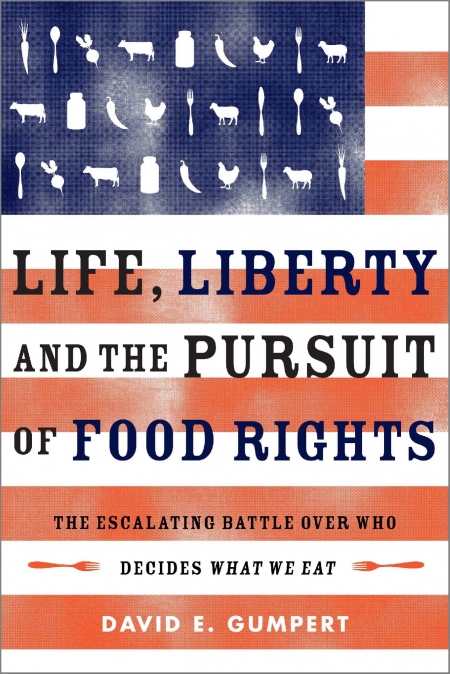Life, Liberty, and the Pursuit of Food Rights
The Escalating Battle over Who Decides What We Eat
This in-depth look at the government’s treatment of raw food producers and distributors is a rallying cry against all unnecessary regulation.
Before the advent of pasteurization in the 1860s, there was no food processing and little regulation. Since then, “a lot has changed in attitudes and approaches toward food safety,” despite what some believe is evidence suggesting chemical processes that match FDA standards are unhealthy and raw foods are not dangerous. So claims journalist David E. Gumpert, who makes a strong case in Life, Liberty, and the Pursuit of Food Rights that restrictions on raw food distribution and consumption are impinging our basic rights as American citizens.
The journey begins when Gumpert introduces readers to Dan Allgyer, an Amish farmer whose home was raided by the FDA when the agency discovered he was selling unpasteurized dairy products to consenting consumers through a food club. Though he’d been running his business for many years, Allgyer began to worry when hearing of other farmers who had been forced by the FDA to destroy thousands of dollars worth of food, even made to pour bleach over it so they could not feed it to their own pigs.
Gumpert relays competently Allgyer’s story and those of other farmers, distributors, and consumers—including that of the Right to Choose Healthy Food Rawesome Club, which required customers to pay a yearly fee to purchase raw milk, eggs, and meat. “There were two key factors in the decision to acquit, Hemingway [a juror] told me. First, the fact that no one became sick from Schlangen’s [a distributor] food was very important. One of the three misdemeanor charges accused Schlangen of providing ‘adulterated or misbranded’ food, and the absence of illness suggested no adulteration. … A second important factor was the notion that Schlangen wasn’t selling, but rather distributing food he obtained on behalf of members.”
The examples Gumpert provides of overregulation—such as the illegality of raw milk, even when produced for private use by a family cow, and the FDA’s destruction of raw foods that tested negative for harmful bacteria—are made more assertive by quotes from first-hand witnesses, legal documents, and testimonies, which he skillfully weaves into the narrative to make for both an engaging and authoritative read.
Also effective are Gumpert’s inclusions of a short history of food processing and FDA regulations, as well as statistics regarding how safe it is to consume raw food. He shares the stories of parents of children with ADHD and asthma who have shown improvement without medication, crediting their health to daily consumption of raw milk.
While the lay reader may have difficulties following the pasteurization process lingo and legal jargon, those with knowledge of food regulation, farmers and co-op members, or those interested in public administration, will admire Gumpert’s efforts. This book is not simply a portrayal of people who have been affected by the increased enforcement of FDA regulations, but is more significantly an argument against regulations that infringe on Americans’ rights to choose what they eat or drink.
Reviewed by
Aimee Jodoin
Disclosure: This article is not an endorsement, but a review. The publisher of this book provided free copies of the book and paid a small fee to have their book reviewed by a professional reviewer. Foreword Reviews and Clarion Reviews make no guarantee that the publisher will receive a positive review. Foreword Magazine, Inc. is disclosing this in accordance with the Federal Trade Commission’s 16 CFR, Part 255.

